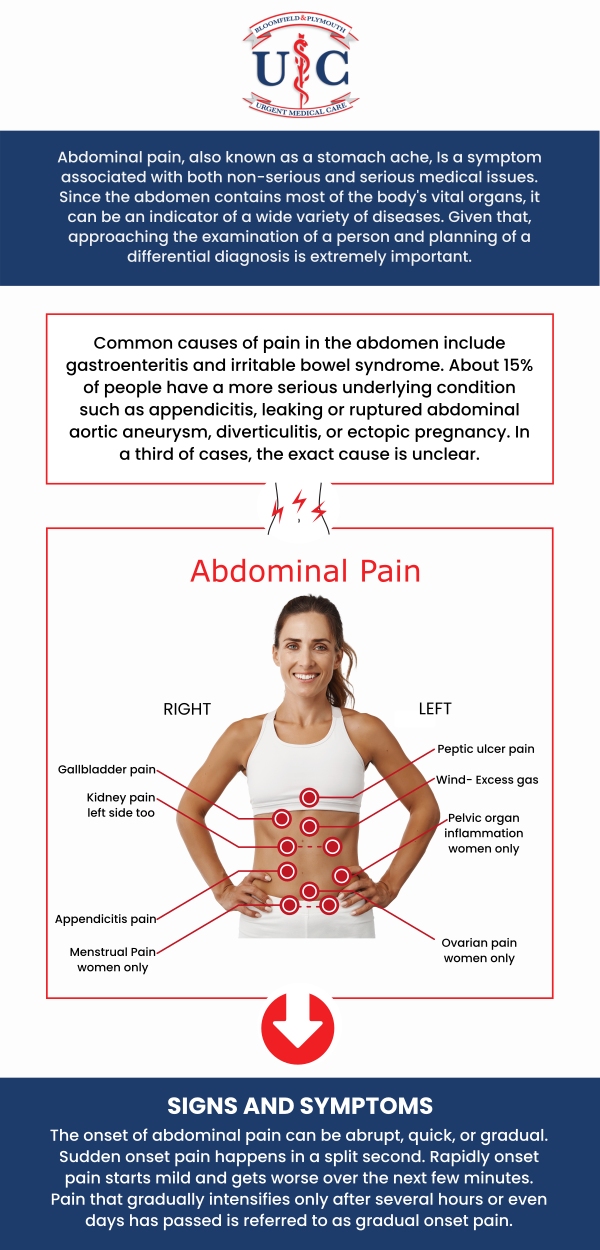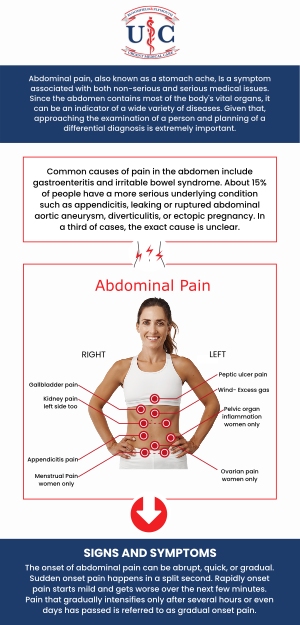Understanding Lower Abdominal Pain in Females: Common Causes and Symptoms
Lower abdominal pain in females can be caused by a wide range of factors, from digestive issues to reproductive health concerns. At Plymouth Urgent Care & Bloomfield Urgent Care, we help determine the underlying cause of lower abdominal pain and provide the appropriate treatment to improve your health and well-being. Our experienced team is here to offer prompt evaluations and personalized care to ensure you receive the best possible treatment. Contact us today for more information or schedule an appointment online. We have convenient locations to serve in Plymouth MI, and Bloomfield Hills MI.


Table of Contents:
What are the most common causes of lower abdominal pain in women?
When should a woman seek medical attention for stomach pain?
Can lower abdominal pain be a sign of a urinary or kidney infection in women?
What lifestyle changes can help alleviate lower abdominal pain in females?
Lower abdominal pain is a common concern among women, and it can arise from a variety of causes. At Plymouth Urgent Care & Bloomfield Urgent Care, our experienced medical team is here to help diagnose and treat the underlying issue, whether it’s related to the reproductive, digestive, or urinary systems. Lower abdominal pain in women can be caused by a variety of conditions.
Some of the most common causes include:
• Menstrual Cramps: Pain during menstruation is one of the most common causes of lower abdominal discomfort, often involving cramping and bloating.
• Ovarian Cysts: Pain can result from fluid-filled sacs that develop on the ovaries, especially if they burst or twist, which can cause abrupt, intense pain.
• Endometriosis: A condition where tissue similar to the lining of the uterus grows outside of it, causing pain, heavy menstrual bleeding, and potential infertility.
• Pelvic Inflammatory Disease (PID): An infection of the reproductive organs, usually caused by sexually transmitted infections, can lead to pain and discomfort in the lower abdomen.
• Urinary Tract Infections (UTIs): UTIs can cause pain or a burning sensation in the lower abdomen, along with frequent urination and discomfort during urination.
• Irritable Bowel Syndrome (IBS): A gastrointestinal disorder causing cramping, bloating, and changes in bowel habits, often contributing to lower abdominal discomfort.
• Constipation: Difficulty passing stool can lead to bloating and pain in the lower abdomen.
• Fibroids: Non-cancerous growths in the uterus that may result in symptoms such as discomfort and heavy menstruation.
If the pain is persistent, severe, or accompanied by other concerning symptoms, it is important to consult a healthcare provider for a proper diagnosis and treatment. At Plymouth Urgent Care & Bloomfield Urgent Care, we offer prompt assessment and treatment for a wide range of women’s health concerns. We care about your well-being and tranquility. Our caring healthcare professionals are available to assist you in finding the answers and relief you require.
A woman should seek medical attention for stomach pain if it is persistent, severe, or accompanied by other concerning symptoms.
Situations where medical attention is necessary include:
• Severe or sudden pain: Intense, sharp pain, especially if it comes on suddenly, could be a sign of a serious condition like appendicitis, an ovarian cyst, or a hernia.
• Pain accompanied by vomiting or fever: If stomach pain is accompanied by vomiting, fever, or chills, it could indicate an infection or other serious condition requiring immediate care.
• Pain that radiates to other areas: Pain that radiates to the back, chest, or shoulder, especially if it is severe, could indicate a problem with the heart, gallbladder, or digestive system.
• Changes in bowel movements or urine: If stomach pain is associated with diarrhea, constipation, blood in stool, or changes in urine, medical evaluation is needed to determine the cause.
• Abdominal swelling or bloating: If there is noticeable swelling or bloating in the abdomen, particularly if it is painful, it could be a sign of conditions like ovarian cysts, fibroids, or gastrointestinal issues.
• Pain during pregnancy: Stomach pain during pregnancy, particularly in the later stages, should be evaluated to rule out complications like preterm labor or ectopic pregnancy.
Seeking timely medical attention ensures proper diagnosis and treatment, helping to avoid potential complications. If you’re experiencing any of these symptoms, it is best to consult a healthcare provider for an evaluation. At Plymouth Urgent Care & Bloomfield Urgent Care, our dedicated staff is here to provide the prompt, compassionate care you need to feel better and stay healthy. We are committed to offering high-quality treatment with a focus on your well-being, ensuring you receive the best care possible every step of the way.
Lower abdominal pain can sometimes be a sign of a urinary tract infection (UTI) or a kidney infection, especially in women. UTIs are common and often present with symptoms like a burning sensation during urination, frequent or urgent need to urinate, cloudy or strong-smelling urine, and discomfort in the lower abdomen, typically around the bladder area.
If a UTI spreads to the kidneys, it can lead to pyelonephritis, which causes more severe symptoms, including back or side pain (flank pain), fever, chills, nausea, or vomiting. Kidney infections require prompt medical attention to avoid complications. However, it’s important to note that lower abdominal pain can have many causes, including menstrual cramps, gastrointestinal issues, or gynecological conditions. If you experience persistent or severe lower abdominal pain, especially with symptoms like fever, blood in urine, or difficulty urinating, seek medical attention as soon as possible.
At Plymouth Urgent Care & Bloomfield Urgent Care, we offer a thorough evaluation and the care you need. Our experienced medical team is here to diagnose the cause of your pain and provide the appropriate treatment to help you feel better as soon as possible.
At Plymouth Urgent Care and Bloomfield Urgent Care, we often see patients experiencing lower abdominal pain. While there are many possible causes of lower abdominal pain, several lifestyle changes can help reduce discomfort and support overall pelvic health:
• Balanced Nutrition: Eating a nutritious diet can minimize bloating and constipation, which are common triggers for abdominal pain. Increasing fiber intake and staying well-hydrated can help regulate digestion.
• Physical Activity: Regular exercise, such as walking, swimming, or yoga, can improve circulation and reduce stress, both of which are beneficial for pelvic health.
• Stress Management: Techniques like deep breathing, meditation, or mindfulness can help decrease the severity of abdominal symptoms, as stress can worsen pain.
• Healthy Habits: Avoid delaying urination or bowel movements, and practice good hygiene. Tracking your symptoms and habits can help identify patterns, which is helpful when discussing with a healthcare provider.
• Limit Triggers: Reducing intake of caffeine, alcohol, and processed foods may help lessen discomfort for some individuals.
• Maintain a Healthy Weight: Keeping a healthy weight can reduce strain on abdominal and pelvic organs, helping to alleviate discomfort.
Despite these lifestyle changes, if your lower abdominal pain continues or worsens, it’s important to seek timely medical care. At Plymouth Urgent Care and Bloomfield Urgent Care, our experienced providers can evaluate your symptoms and guide you to the most appropriate treatment. We also offer X-ray, lab testing, telemedicine, and preventive care to ensure comprehensive treatment and support for your health needs.
Contact us today for more information or schedule an appointment online! We have convenient locations to serve in Plymouth MI, and Bloomfield Hills MI. We serve patients from Plymouth MI, Bloomfield Hills MI, Livonia MI, Novi MI, Worden MI, Canton MI, Southfield MI, Troy MI, Farmington Hills MI and BEYOND.

Check Out Our 5 Star Reviews


Additional Services You May Like
▸Urgent Care
▸Covid-19 Testing
▸Primary Care
▸Occupational Health
▸Physicals
▸Digital X-ray
▸Lab Testing
▸Telemedicine
▸Ear Wax Removal
▸Auto-Accidents
▸Vision Testing
▸Pre Op Physicals

Additional Services You May Like
▸Urgent Care
▸Covid-19 Testing
▸Primary Care
▸Occupational Health
▸Physicals
▸Digital X-ray
▸Lab Testing
▸Telemedicine
▸Ear Wax Removal
▸Auto-Accidents
▸Vision Testing
▸Pre Op Physicals



